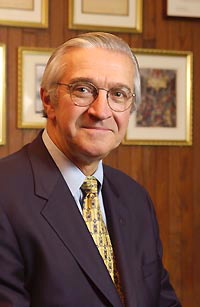|
This is an archived article.
For the latest news, go to the
Advance Homepage
For more archives, go to the Advance Archive/Search Page. | ||
We are at the forefront of geriatrics, not only in providing care but in creating new knowledge. I've noticed it and I am sure you have too. It seems senior housing developments are popping up no matter where you turn in the neighborhoods surrounding the Health Center and throughout central Connecticut. So I wasn't surprised to hear a radio report a few weeks ago saying that senior housing, in one form or another, now accounts for one in every four new homes being built in the United States.
Whether they provide dependent care, assisted living, or are designed for active, independent older adults, the growing presence of these facilities points to an important trend - not just in lifestyle, but in medicine. The "Graying of America" is something we have been hearing about for some time, and a quick glance in the mirror is all that is needed to remind me that, like it or not, I am very much a participant. The numbers locally and statewide show that our population is indeed aging. What gives me great pride is the fact that our Health Center is truly at the forefront of geriatrics, and not just through the provision of outstanding specialized care. In so many ways, we are creating new understanding and knowledge that will enable aging populations to live better, more independent lives for longer periods of time, compared to the standards of today. Our strong presence in geriatrics is nothing new, and under the leadership of Dr. George Kuchel, it promises to grow even stronger. Through the UConn Center on Aging and our Claude Pepper Older Americans Independence Center we have a long-standing, nationally recognized tradition of excellence in this field. This was most recently acknowledged in July, when U.S. News & World Report named John Dempsey Hospital one of America's Best 50 Hospitals for geriatric services. The U.S. News honor is particularly gratifying because of the criteria on which selection is based. In choosing which providers make the list, the publication considers not only the care given by geriatricians, but the overall quality of care provided to elderly patients: that means the full spectrum of care provided by all physicians, nurses and social services. To be so named by U.S. News illustrates how geriatrics touches upon so much of what we do at the Health Center. We must not overlook the potential impact of being good at delivering care to the elderly. Historically, seniors have been high utilizers of clinical services. New techniques and treatments, particularly in cardiac and orthopedic care, are now being used more often for the very elderly, making this segment of the population even more likely to seek care, especially where there is a recognized reputation for clinical excellence. I've said on many occasions that our geriatrics expertise is core to our signature programs, but it goes far beyond our Cancer, Brain & Human Behavior, Musculoskeletal and Connecticut Health initiatives. It impacts every clinical area except neonatology and pediatrics and, importantly, extends into research and educational endeavors as well. Our research activities on issues related to aging are vast, and range from the laboratory bench to the bedside. Our scientists and physicians are investigating bladder and cardiac function in the elderly, alternative medicines, and many aspects of musculoskele tal health and mobility late in life, all in an effort to prolong independence and improve the quality of life for the elderly. I'm pleased that our considerable expertise in geriatrics research continues to be recognized, both close to home and beyond. Recently one of our faculty, Steven Helfand, was honored with a Senior Scholar in Aging Program Award, a highly prestigious and competitive national award for aging research given by the Ellison Medical Foundation. You may recall Steven and his team received international recognition within the past year for their discovery of a gene that doubles the average life span of fruit flies - a gene that is also found in humans. Also this year, Karen Prestwood and her colleagues brought further national attention to the Health Center with research findings that challenged the notion that hormone replacement with estrogen is risky in older women and that "one dose fits all ages." The obligation to share our knowledge with others who serve the aging is one we take quite seriously. For 15 years, the Health Center has run "Fundamentals of Geriatric Medicine," a popular 10-week course that typically attracts from 75 to 100 physicians and other professionals from throughout western New England. In addition, we're working alongside other state agencies in Connecticut on aging issues impacting groups with special needs. In one such initiative, we're teaming with the Department of Mental Retardation to provide improved care for mentally retarded adults as they get older. The irony of all this is that geriatrics is still considered a "young" field within medicine. Today's experts, both here at the Health Center and elsewhere, are viewed as first generation leaders. Through the dedication displayed by our people and the recruitment of talented new faculty and staff, I fully anticipate the Health Center will remain at the apex of this exciting, and critically important, discipline. After all, I hope someday to avail myself of these services. And I expect nothing but the very best! Be peaceful. |

